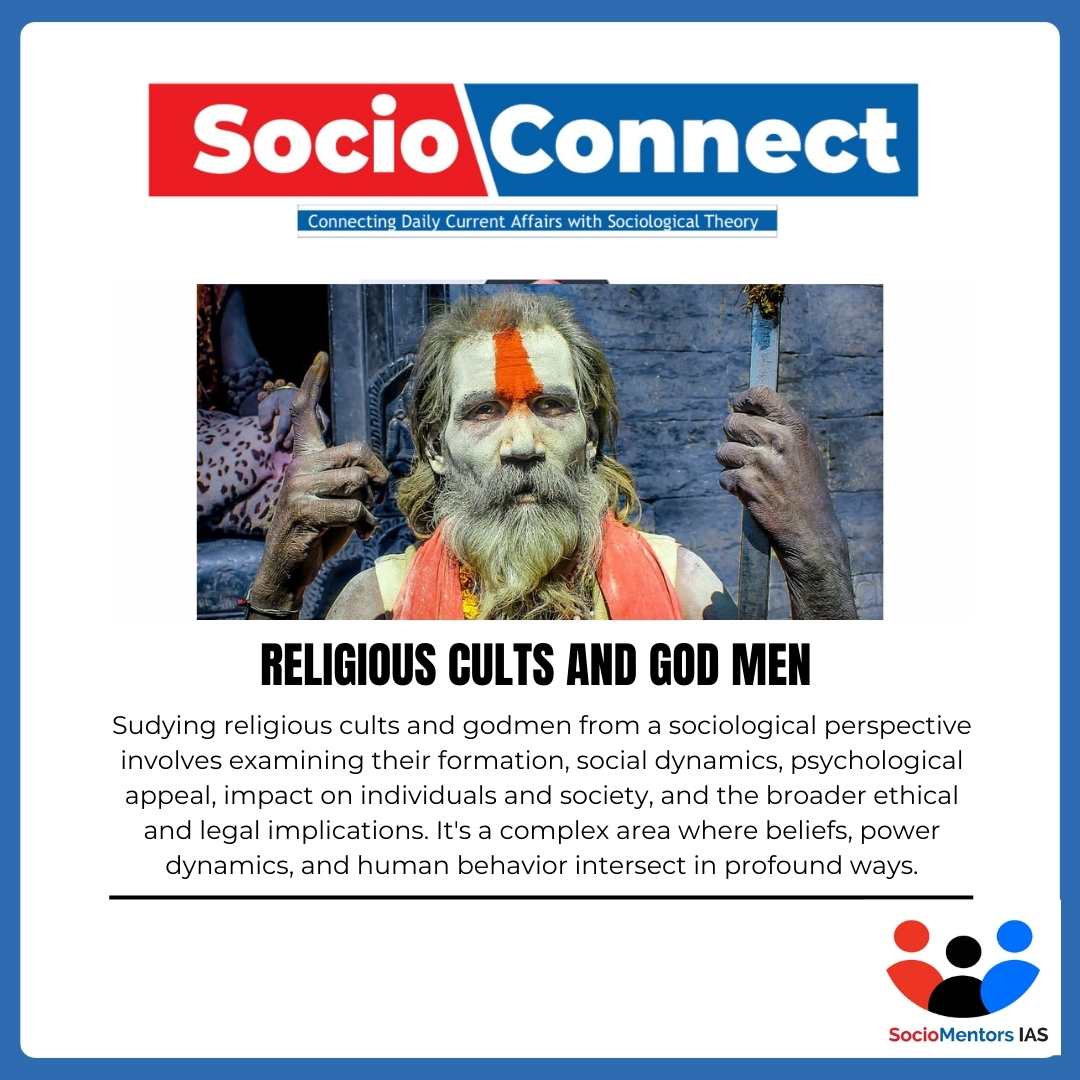Religious Cults and God Men – Sociological perspective
July 10, 2024
Contemporary societies have been witnessing rapid social change with respect to globalization, industrialization, and urbanization. The values and norms that bind the society have undergone profound changes. Growth of religious cults and Godmen can be considered as a part of new religious movements that offer a better quality of life in a disarrayed world or as manifestation of religious revivalism and spread of fundamentalism in society.
Growth of Cults & God Men
Theoretical analysis
- Weakening of institutional support systems like joint families, caste networks, and village communities creates a sense of alienation in the urbanized Indian middle class according to Pavan K Verma. Godmen and cults provide solace in highly impersonal bureaucratic megastructures like urbanized mass society. It gives face to face contact with peers who share common feelings.
- Bryan Wilson says that in the process of secularization, various social institutions got detached from the larger matrix of religious assumptions that had earlier informed, inspired and dominated their operation. As a result,smaller and diverse factions of religion started mushrooming.
- Steve Bruce connotes the proliferation of religious cults to modernisation and industrialisation, which caused the growth and fragmentation of different cultural and religious groups to come into contact.
- Olridge says that cults are prevalent in modern societies due to various reasons:
- Religion guarantees salvation in the afterlife whereas cults provide relief in this life itself.
- Religion addresses spiritual needs whereas cults provide solutions to mundane problems.
- Religion poses the difficulty of direct communication while members of a cult interact face to face with each other.
- Ulrich Beck presents the idea of risk society which evolved as a result of excessive modernisation. One of the consequences of such a risk society is people pursuing newer faith and solace and redefining older definitions of orthodoxical religions – turning towards cult membership and God men.
- According to Rajeev Dubey, the willingness to assimilate the techniques of materialistic west with the spirituality of the East gave a greater outreach for these cults. Eg: Transcendental Meditation and Hare Krishna.
- The growth of right-wing political parties has also led to conservatism from a section of society. Many Godmen and cults enjoy political patronage from highest authorities in bureaucracy and government.
- In tune with globalization, spiritual space also has also been trivialized to consumer items and commodified according to Peter Berger. Vineeta Sinha in her book “Religion and Commodification” says that marketplaces have taken over daily religious practices in the form of various kinds of commodities which are strategically placed in the mindset of people. Cults and Godmen play a significant part in this.
Perspectives
- Popularity of cults and godmen can be considered as a response to rapid social change. According to Durkheim, norms and views of religion work as glue to hold society together. In times of rapid social change, the old norms no longer apply and to compensate for the anomie, new forms of religion like cults and Godmen appear to give stability.
- To understand participation of lower-class people in these cults, Weber’s principle of ‘Theodicy of Disprivilege’ can be used. It refers to the belief of the promise that salvation may be granted as a reward for earthly poverty. It can be one of many reasons that explain the large numbers of lower class people who join religious sects and follow God men.
- From a subaltern perspective, marginal sections of society find acceptance and recognition within these cults which gives them a sense of equality and participation in the spiritual sphere.
- From a Marxian perspective, it can be argued that many cults and groups are run like capitalistic businesses houses. They operate businesses both charitable and otherwise and leverage the charismatic personality of their leader to further their capitalistic agendas.
- From a Mertonian perspective, it could be argued that growth of Godmen and cults is latent dysfunction of lopsided and uneven modernisation which has resulted in identity crisis among people.
Thus, in short, they help to lessen the ambiguities and anxieties inherent in a hypermodern and technological civilisation of today. The marginal sections through the new religious cults find an equal platform where they can relate to their reference groups. On the other hand, many such cults and godmen have exploited innocent people and a number of harassment and abuse cases have been reported related to some cults and Godmen. Spirituality and religion have always been a significant feature of Indian society. However, the reasons behind the rapid growth of cults and Godmen deserve serious sociological introspection.
Religious Cults and God Men – UPSC Sociology Optional



